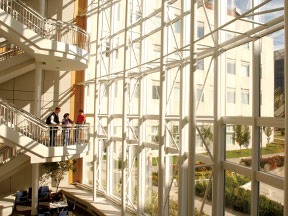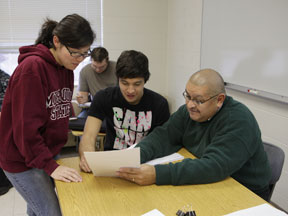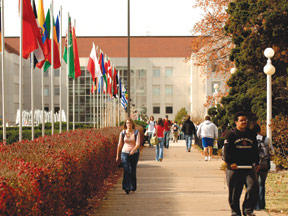
Thank you to those who took time to come to the State of the University address yesterday (Tuesday, October 5). For those who weren’t able to attend, I invite you to hear the audio of the address on the website. Within a few days, a video version also will be available online.
I want to take this opportunity to acknowledge the expressions of support and sympathy we received following the passing of Deborah’s mother, Doris Jones. Both Deborah and I are touched and overwhelmed by your thoughtfulness. It made us feel very much at home, and demonstrated once again that Missouri State University truly is a big school with a big heart.
Nine goals for 2010-11
My address yesterday centered on the nine goals for this year. These goals have been discussed, revised and now affirmed by the Board of Governors. We will be taking the necessary steps to achieve these goals. Again, I refer you to the speech itself for details.
Long-range plan
 The first of the nine goals is to complete the long-range plan. We have now posted the strategic directions for the long-range plan (2011-16) on the website. This document is the synthesis of the good work that has been done by the more than 100 members of the seven work groups.
The first of the nine goals is to complete the long-range plan. We have now posted the strategic directions for the long-range plan (2011-16) on the website. This document is the synthesis of the good work that has been done by the more than 100 members of the seven work groups.
I need to emphasize again that this is the current draft. It is a work in progress. In the coming weeks, our intent is to reduce and further focus these so that we have a select number of meaningful strategic directions. We want your help in that process.
So, I invite you to review that document and provide feedback how best to further refine this list. We also will seek your feedback on the first full draft of the plan and throughout the process.
Our target timeline calls for us to present a first draft to the Board of Governors at its December meeting and then get final Board approval in February 2011, but we are prepared to adjust the timeline so we have the time it takes to complete this process. We will seek input from the campus community, our alumni, the community, and others throughout this process in order to develop the best plan possible.
Again, it is crucial that we look beyond the horizon as we develop our long-range plan. The goal is to describe the University we will develop for the students who are in grade school and middle school today. It is simultaneously an exciting and daunting responsibility.
Budget process
Finally, also as promised, I am providing the details of the budget process we will follow every year.
For fiscal year 2012, we do not have specific numbers, but we do know our state appropriations will be reduced. We will launch the process, lay the knowledge foundation, and then address the specific numbers as soon as we have the specifics. I know the process will be hard and slow and messy and, at times, frustrating. But in the end, we will have a better budget than we would without this process. We need to take full advantage of the intellect and concern for Missouri State that exists on this campus as we face the budget challenges that confront us over the next 2-3 years.
The progress of the budget committees will be documented and posted on a website that we will develop. I expect that the members of these committees will be named no later than October 15 and begin their work soon thereafter.
Low-completer programs
 As I indicated to you in my speech, the state’s leadership in Jefferson City has initiated a process to look at “low-completer programs,” defined by the Department of Higher Education (DHE) and the Coordinating Board for Higher Education (CBHE) as those undergraduate programs that average fewer than 10 graduates over three years and those graduate programs that average fewer than 5 graduates over three years. The key question that has yet to be answered is: At what program level are these to be evaluated?
As I indicated to you in my speech, the state’s leadership in Jefferson City has initiated a process to look at “low-completer programs,” defined by the Department of Higher Education (DHE) and the Coordinating Board for Higher Education (CBHE) as those undergraduate programs that average fewer than 10 graduates over three years and those graduate programs that average fewer than 5 graduates over three years. The key question that has yet to be answered is: At what program level are these to be evaluated?
Provost McCarthy, with the other chief academic officers in the state, is working with the Department of Higher Education to clarify the criteria, the process, and the timeline for reporting on low-completer programs. The Department of Higher Education will develop the list of low-completer programs. Then, Dr. McCarthy and her staff will work with the Deans to develop responses with their department heads and faculty. We will make changes where it makes sense, but we also will defend our programs and the work you do here.
We will keep you informed as this process moves forward.
Transparency and inclusiveness
 I promised you transparency and inclusiveness. You will get both. I can promise you that this style will be messy and frustrating at times. There will be suggestions we accept, there will be suggestions that we reject, and there will be suggestions we improve. We will discuss and debate all suggestions; no suggestion is a fait accompli. In the end, I also can promise you that the long-range plan and budget decisions we come up with will be better because of the process. It will be “our budget,” not “my budget.”
I promised you transparency and inclusiveness. You will get both. I can promise you that this style will be messy and frustrating at times. There will be suggestions we accept, there will be suggestions that we reject, and there will be suggestions we improve. We will discuss and debate all suggestions; no suggestion is a fait accompli. In the end, I also can promise you that the long-range plan and budget decisions we come up with will be better because of the process. It will be “our budget,” not “my budget.”
I am reminded of an observation by Ronald Heifetz in his book “Leadership without Easy Answers:”
“In a crisis we tend to look for the wrong kind of leadership. We call for someone with answers, decision, strength, and a map of the future, in short someone who can make hard problems simple.
“Instead of looking for saviors, we should be calling for leadership that will challenge us to face problems for which there are no simple painless solutions – problems that require us to learn in new ways.”
I am anxious to work with you on these important initiatives to help move Missouri State University forward.
 Sincerely,
Sincerely,
James E. Cofer, Sr.
President
- Dear Colleague Vol. 1, No. 10 - June 21, 2011
- Fiscal Year 2012 Operating Budget Approved - June 17, 2011
- Dear Colleague Vol. 1, No. 9 - June 10, 2011
- Fiscal Year 2011-12 Operating Budget Summary - May 13, 2011
- JQH Arena Task Force Report - May 10, 2011
- Dear Colleague Vol. 1, No. 8 - May 5, 2011
- Dear Colleague Vol. 1, No. 7 - February 24, 2011
- Missouri State responds to governor’s budget recommendation - January 20, 2011
- Dear Colleague Vol. 1, No. 6 - December 17, 2010
- 2011 Voluntary Retirement Incentive Plan - December 17, 2010

